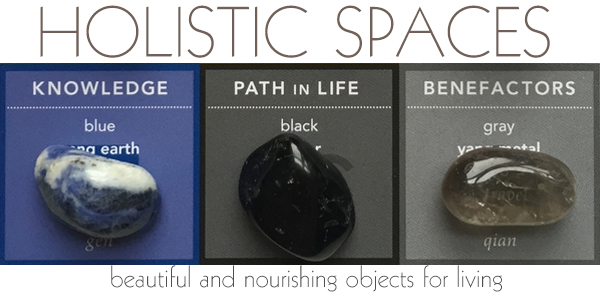We are looking to move to a new home. What positive feng shui elements should we look for when looking for a new home?
Margaret W., Seal Beach, CA
Just in case you didn’t know, Margaret is my sister and the co-owner of Holistic Spaces Studio!
Margaret, I get this question a lot! First of all, it really is the best to start looking for or designing a home from the beginning with feng shui in mind. This way you can avoid doing remedial feng shui. While most feng shui is remedial, it’s most ideal to get it right to begin with! Because each home and family has different needs, I’ll address the general exterior elements that affect the feng shui of a home.
Neighborhood Chi
As you approach the new home, pay close attention to the chi (or energy) of the neighborhood. Are the trees healthy? Is the neighborhood vibrant? Do the neighbors appear happy? You can gather a lot of information from observing the area. From the feng shui perspective, when the natural and human elements in the surrounding area are lively and lush it’s a good indication that the inhabitants will dwell similarly.
Curb Appeal
Getting closer to the prospective home, examine the condition of the exterior including the landscaping, the curb and location of the entry door. Like the neighborhood chi, in feng shui we look for healthy landscaping and good curb appeal. The exterior appearance influences how the world will see the homeowners. We want the exterior to be welcoming and well manicured. The location of the door is also important. Was it easy to find the front door? Or is it hidden behind an overgrowth of bushes? The ease in which you can find the front door indicates how effortless it will be for opportunities and positive energy to find their way into your life.
Predecessor Chi
If possible, research as much information as you can about all the previous owners. The fates of the preceding inhabitants surely affect the feng shui of the home. The predecessor energy may indicate a happy and abundant lifestyle. On the other hand it may expose leanings towards health or money troubles. This is especially true if there are recurring patterns. But if you find a home that you love, there are usually ways to clear the home of the negative predecessor chi with space clearing techniques.
By the way, in case you're also selling a home, here are some feng shui tips for sellers!
Overall, it’s important to look at the location, exterior and history of a home before you decide to move. We want your home to improve and support the health, happiness and prosperity of you and your family.




